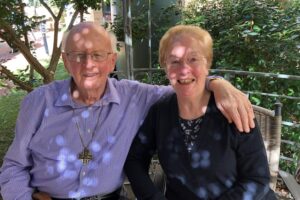Here are a couple of real-life stories from the recent press that illustrate situations where retail and/or Industry Superfunds are not that helpful (and some may argue, downright obstinate) when someone passes.

It may surprise you to learn that:
- Your Superannuation does not naturally form part of your estate.
- Nominating someone to receive your superannuation money if you die does not guarantee the funds will go to the person.
The first one is from Muriel Porter, who posted her story on 24th January 2023.
Muriel’s husband Brian was diagnosed with Alzheimer’s, so the couple immediately set in place enduring powers of attorney and guardianship arrangements and ensured that all utilities and bank accounts were in joint names.
 Brian’s Will was straightforward, leaving everything to Muriel, and the signed superannuation documents nominating Muriel as his beneficiary.
Brian’s Will was straightforward, leaving everything to Muriel, and the signed superannuation documents nominating Muriel as his beneficiary.
When Brian died in November 2022, Muriel found herself overwhelmed with grief and a nightmare of administration.
Once the two super funds were notified of her husband’s death, the pensions stopped, without any warning, without notification.
Muriel was faced with endless paperwork the super funds now require, and it appears that Brian’s regular notifications to the funds that his pensions were to revert to his wife on his death were close to meaningless.
Muriel recounts: “I had to get certified copies of my husband’s birth certificate, my birth certificate, our marriage certificate, his death certificate, the probate document, and his Will.
Next, I have had to produce evidence of my identity. So certified copies of my passport and driver’s licence were required.”
Once all that paperwork was delivered to the super funds, Muriel had to wait a few weeks for the trustees to assess the situation and decide Brian’s heir.
Muriel learned the hard way that bureaucracy is not streamlined nor unlikely to become so.
“Talking to other recent widows, I have discovered my situation is typical.
Like me, these women are struggling with paperwork and rules and financial discomfort they never dreamed they would face as they confront their grief.”
You can read Muriel’s story here.
Our second example was published in Dec 2021
 It concerned the relationship between Victorian magistrate Rodney Higgins, 68, and a 23-year-old court clerk Ashleigh Petrie.
It concerned the relationship between Victorian magistrate Rodney Higgins, 68, and a 23-year-old court clerk Ashleigh Petrie.
The grandfather of eight proposed on a 10-day holiday to Fiji, but five weeks later, Ms Petrie died when she was hit by a car in Metung, in Victoria’s rural East Gippsland, on October 28 2019.
Mr Higgins called Rest Superannuation and informed them of Ms Petrie’s death and that he was her fiancé.
Despite Ms Petrie’s mother being nominated as the beneficiary of both her life insurance and her superannuation, Mr Higgins filled in some forms and pocketed the $180,000.
The mother challenged Rest Superannuation’s decision, and a court case ensued.
Her lawyer, Kimble Stynes, said Ms Petrie’s mother, Tina, was “very shocked’ to learn that Rest intended to give the money to Mr Higgins.
“She understood she had been nominated, and that’s correct, she had been nominated, in the death benefit under the superannuation, and she was very shocked and very upset that Rest had indicated their intention to give that death benefit to a claimant.”
After two years of drawn-out negotiations, it was reported that Ms Petrie’s mother will receive about half of the death benefits.
“Nothing will take away the pain and sorrow of losing Ashleigh. Ashleigh was a gorgeous daughter and sister to her brother, and she is missed every day,” Tina said.
“The whole process with the superannuation death benefit has been incredibly upsetting, stressful and emotional. Thankfully it is now over.”
You can read more details of the story here.
So, who inherits your super?
- Superannuation is not considered a part of your Estate, so it does not automatically become part of your Will.
- When you join a superfund, you will usually be asked to nominate who should receive your money if you die before you use it. Some people may also designate their Estate as the beneficiary.
- To be relatively certain that your super actually goes to your intended beneficiary, you need to ensure that you make a Binding, Non-lapsing Nomination.
What about a Self-Managed Superfund?
Essentially, with an SMSF, you control the trustee(s), so you get to decide what happens to your super.
As part of the setup process, there is usually an SMSF Will or a Non-Lapsing, Binding Death Nomination to ensure that your money goes to who you want it to, when you want it and when they need it.
We can set up a Reversionary Pension so that the loved one left behind can receive your pension (as if it were still being paid to you).
This way, they don’t have to worry about money for day-to-day living when they are going through one of the most traumatic times of their lives.



